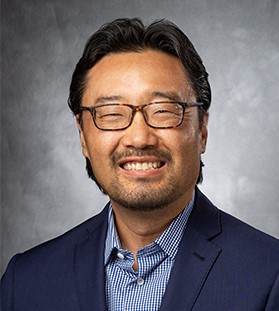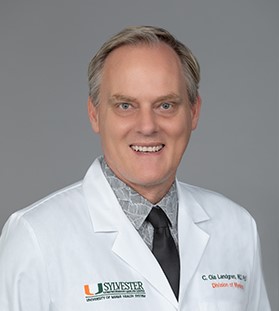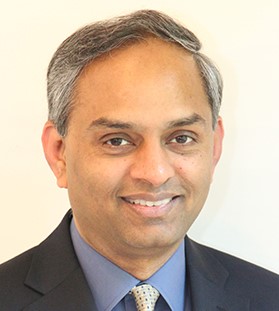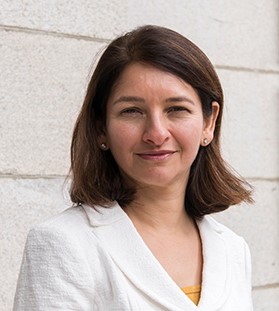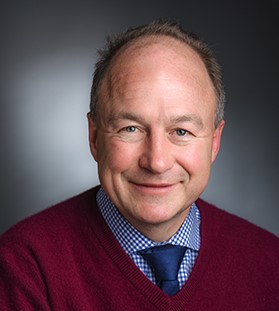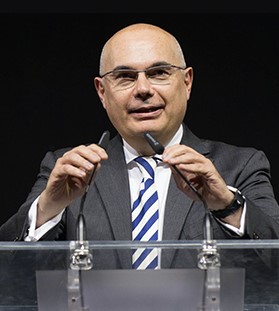Dr. David S. Hong is the Douglas E Johnson Endowed Professor in and Deputy Chair of the Department of Investigational Cancer Therapeutics at the University of Texas MD Anderson Cancer Center, and Clinical Medical Director of its Clinical Translational Research Center. Dr. Hong was a pioneering driver in forming one of the largest and most innovative Phase I clinical trial units in the world, with over 1,200 patients enrolled in clinical trials in 2022 and over 280 active ongoing clinical trials. Dr. Hong has been the Principal Investigator of ~110 research protocols and published over 400 articles in peer-reviewed journals such as New England Journal of Medicine, Lancet Oncology, etc. Dr. Hong was heavily involved in the early development of many oncology drugs including cabozantinib, siltuximab, dabrafenib, trametinib, regorafenib, lenvatinib, larotrectinib, tisotumab vendotin, tepotinib, and sotorasib.
Dr. C. Ola Landgren is Professor of Medicine, Chief of the Myeloma Division, Director of Sylvester Myeloma Institute, Paul J. DiMare Endowed Chair in Immunotherapy, Leader of the Experimental Therapeutics Program, and Co-Leader of the Translational and Clinical Oncology (TCO) Program at NCI-designated Sylvester Comprehensive Cancer Center, University of Miami. Prior to joining University of Miami, he served as Chief of the Myeloma Service at Memorial Sloan Kettering Cancer Center in New York City, and prior to that he was the Chief of the Multiple Myeloma Section at the National Cancer Institute in Bethesda, Maryland. Dr. Landgren is a board-certified hematologist-oncologist and he has published more than 500 papers and chapter books with a primary focus on multiple myeloma, MGUS (monoclonal gammopathy of undetermined significance), and smoldering myeloma. Dr. Landgren’s research focuses the mechanisms underlying progression from precursor disease to frank malignancy, underlying mechanisms of disease response/resistance, role of minimal residual disease (MRD) negativity, biological mechanisms associated with sustained MRD negativity, identification of novel treatment targets, early drug development, and identification of novel biomarkers.
Dr. Sattva S. Neelapu is a tenured Professor and Deputy Chair in the Department of Lymphoma and Myeloma at The University of Texas MD Anderson Cancer Center. His research is focused on clinical and translational development of novel immunotherapies for B-cell malignancies. His work on the pivotal clinical trial of axicabtagene ciloleucel, CD19 targeted CAR T-cell therapy in aggressive B cell lymphomas, led to its FDA approval as the first CAR T-cell therapy for lymphoma. His laboratory is focused on developing CAR T-cell therapies against novel targets, understanding mechanisms of resistance to CAR T-cell therapy, and developing allogeneic cell therapy approaches. He has authored or co-authored over 275 publications.
Dr. Noopur Raje is a Professor of Medicine at Harvard Medical School, the Director of the Center for Multiple Myeloma, and the Rita Kelley Chair in Oncology at Massachusetts General Hospital Cancer Center, Harvard Medical School. Dr. Raje’s research focuses primarily on developing novel therapeutic strategies for the treatment of multiple myeloma and related plasma cell disorders. Her laboratory efforts are aimed at identifying cellular signaling pathways that contribute to the survival and proliferation of myeloma cells in the bone environment. Her expertise in cellular therapies has led to FDA approval of the first in class CAR T-cell product, idecabtagene vicleucel in myeloma. She has received several awards and has published widely on multiple myeloma.
Dr. Paul G. Richardson is the RJ Corman Professor of Medicine at Harvard Medical School and the clinical program leader and director of clinical research at the Jerome Lipper Multiple Myeloma Center at Dana-Farber Cancer Institute. Dr. Richardson has led the development of several first-generation novel drugs used in multiple myeloma for over 20 years, including the combination of lenalidomide (Revlimid) and bortezomib (Velcade), with the development of the combination of lenalidomide and bortezomib with dexamethasone as frontline therapy in myeloma being one of his important contributions; the subsequent development of this combination with other agents such as daratumumab has been key for improving therapy in newly diagnosed multiple myeloma. He has also had a leadership role in the development of ixazomib, elotuzumab, daratumumab, isatuximab and pomalidomide, as well as more recently melflufen, and belantamab mafodotin. His current research efforts have been in the development of the potent and orally bioavailable CelMods, including mezigdomide. He has published extensively, having authored, or co-authored, over 460 original articles and 340 reviews, chapters, and editorials in peer-reviewed journals. His work has been recognized with multiple awards, including the Robert A. Kyle lifetime achievement award in 2017 and the Warren Alpert Prize in 2012, as well as the Ernest Beutler award in 2016.
Dr. Josep Tabernero, Head of the Medical Oncology Department at the Vall d’Hebron University Hospital, Director of the Vall d’Hebron Institute of Oncology (VHIO) and Professor of Medicine at UVic-UCC. Dr. Tabernero has been Principal Investigator of several Phase I pharmacodynamic studies and translational projects with tumor-directed targeted therapies and immune-based therapies. Dr. Tabernero’s research aims at potentiating molecular therapies targeting specific oncoproteins and accelerating more effective personalized cancer medicines for patients displaying genetic lesions or pathway disregulation. Dr. Tabernero's extensive publication record and leadership roles in prestigious organizations like ESMO highlight his contributions to the field.

